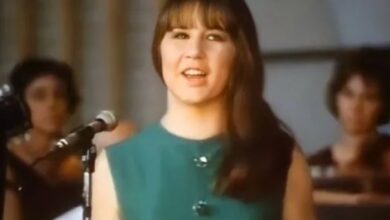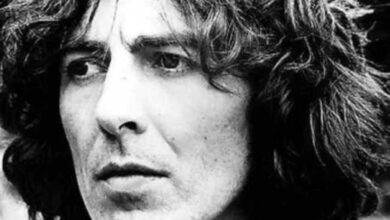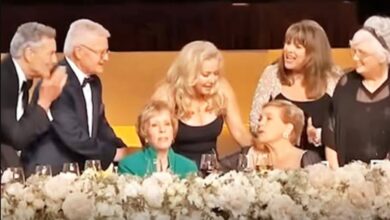The Night That Changed Everything: When The Eagles, Linda Ronstadt, and Jackson Browne Redefined Live Music in 1974
On April 13, 1974, The Eagles made a striking TV appearance on *Don Kirshner’s Rock Concert*, joined by Linda Ronstadt and Jackson Browne—an event that would become one of the most talked-about moments in 1970s music. The show was recorded at the Santa Monica Civic Auditorium, with an intimate audience watching history unfold. None of the artists on stage could have known that this night would come to symbolize a crossroads in American music, where rock, folk, and country converged in perfect harmony.
The concert was part of the band’s promotional cycle for their third studio album, *On the Border*, released that same year. The addition of guitarist Don Felder had given The Eagles a sharper, rock-driven sound, but the essence of their early country-rock identity remained intact. Having Linda Ronstadt and Jackson Browne join them wasn’t just a reunion—it was a celebration of shared roots and musical evolution. Each had influenced the other’s early career, and this performance captured the synergy that had quietly shaped the entire West Coast sound.
When the night began, there was a tangible sense of anticipation. The band opened with “Peaceful Easy Feeling,” setting a warm and familiar tone. The crowd’s applause wasn’t wild—it was reverent. They knew they were witnessing something special. As the setlist unfolded, songs like “Already Gone,” “Midnight Flyer,” and “Good Day in Hell” demonstrated the band’s growing confidence and versatility. Their harmonies were crisp, their guitar interplay razor-tight. But it was the collaborations that turned this from a concert into a cultural landmark.
When Jackson Browne joined The Eagles for “Take It Easy,” time seemed to stand still. The song, which Browne and Glenn Frey had co-written, felt like a reunion between brothers. The way their voices intertwined carried a sense of nostalgia for a musical era that was still being written. Browne’s calm presence balanced the band’s confident swagger, and as the final chord rang out, the audience erupted—not in chaos, but in unified awe. It was a moment of mutual recognition between creators and fans.
Then came Linda Ronstadt’s turn. Her rendition of “Desperado” was, by all accounts, the soul of the evening. Dressed simply, with no theatrics to distract from her voice, Ronstadt took one of The Eagles’ most haunting ballads and made it her own. Her delivery was delicate but full of ache—each note carving directly into the audience’s emotions. The band’s restrained accompaniment made her vocal even more powerful. When she finished, there was a beat of silence before the applause, as if everyone had to catch their breath.
The production team captured the performance with minimal editing and simple camera work. Unlike later televised concerts full of flashy cuts and crowd shots, this one stayed focused on the musicians. You could see every micro-expression, every glance exchanged between Frey, Henley, Ronstadt, and Browne. The lighting was soft, intimate—golden hues that made the set feel like a living room rather than a studio stage. That simplicity only heightened the sense of authenticity.
Backstage, however, the process was far less serene. Multiple takes were needed for certain songs due to sound issues and camera resets. The musicians joked, tuned, and improvised in between, keeping the energy alive. By the time they reached the later numbers, fatigue was visible, yet the chemistry only grew stronger. That contrast between polished sound and behind-the-scenes chaos gives the recording its living, breathing quality—a reminder that even perfection is born out of imperfection.
When *Don Kirshner’s Rock Concert* aired a few weeks later, viewers across America were spellbound. It wasn’t just the performances—it was the atmosphere. The show captured an emotional truth about collaboration and artistry that no script could manufacture. Critics praised it for its sincerity, and fans who had followed each artist separately suddenly saw how deeply intertwined their journeys were. For many, this was the first time they realized that Ronstadt, Browne, and The Eagles weren’t competitors—they were architects of the same musical dream.
The recording quickly gained legendary status. Bootlegs circulated among collectors, and decades later, official vinyl and digital releases would keep the night alive for new generations. The performance became a snapshot of a pivotal era, when songwriting still came from lived experience, and live shows felt like shared revelations rather than entertainment products. Each time “Desperado” plays from that concert, it evokes not just nostalgia, but a visceral reminder of what honest performance sounds like.
Even now, half a century later, the night continues to resonate. Musicians cite it as an example of pure collaboration—no ego, no pretense, just respect and connection. For fans, it remains a sacred memory, the kind of magic that can’t be replicated. The Eagles, Linda Ronstadt, and Jackson Browne didn’t set out to make history that night, but they did. They created something that still haunts, still inspires, and still reminds us that real music doesn’t just fill a room—it fills time itself.





